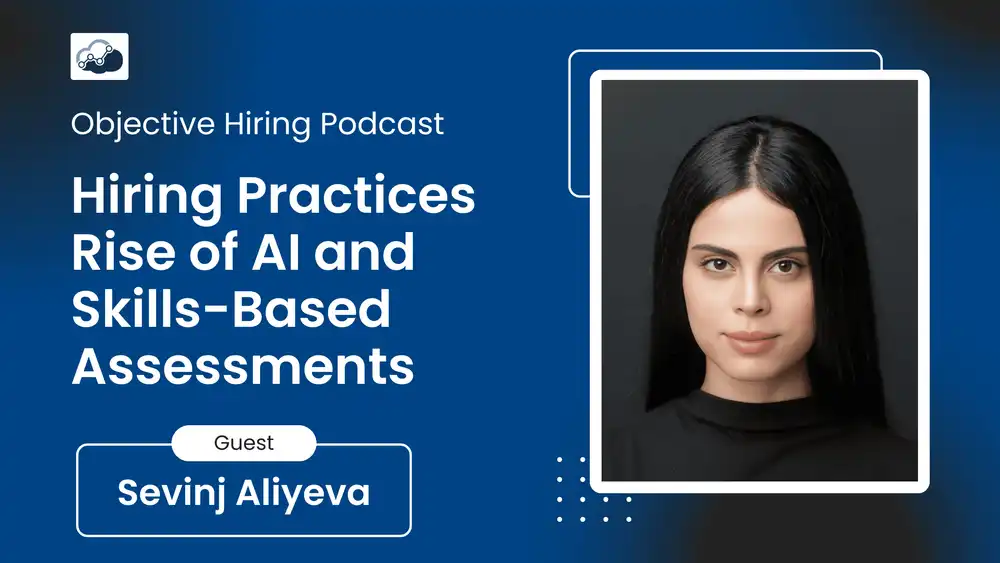Sevinj Aliyeva on AI, Soft Skills, and What Makes a Great Data Hire Today

Sevinj Aliyeva on AI, Soft Skills, and What Makes a Great Data Hire Today
What happens to the role of a data analyst when AI handles the repetitive work? What if your perfect team player can’t write a SQL query? In this episode of the Objective Hiring podcast, Tim Freestone, founder of Alooba, speaks with Sevinj Aliyeva about the shifting expectations for data professionals — and how hiring managers are getting it wrong.
“Data roles aren’t going anywhere. But they’re evolving. Analysts will become business navigators, not just number crunchers.”
Sevinj predicts a future where AI handles the grunt work, and data professionals take on more strategic, real-time decision-making roles. But this evolution also means hiring managers need to rethink what “good” looks like in a candidate.
“They’ll hand over repetitive tasks to AI. Their focus will shift to business intelligence and guiding decisions with insights.”
Tim posed a question many hiring managers have been asking: if roles are becoming more strategic and less technical, should we stop prioritising technical skills?
“Some managers say, ‘Technical skills can be taught — I hire for soft skills.’ But I think that’s risky.”
Sevinj agrees. While communication and collaboration matter, she warns that dismissing technical ability — especially in data roles — often leads to regret.
“Learning SQL or data science isn’t like learning to ride a bike. It takes time and effort. And not everyone will want to learn it once hired.”
That’s a costly mistake if you’re hiring because your team is already overloaded.
“If you're hiring someone to ease your workload, and they can't do half the job, you’ll end up doing the work anyway.”
The discussion then turned to culture fit — a popular but controversial topic in hiring. Many companies prioritise it heavily, but Sevinj cautions against going too far.
“Culture fit matters. But overemphasising it can mean hiring someone who aligns perfectly — yet adds no value.”
She gave an example of a past team where everyone had the same personality type — smooth collaboration, but zero diversity of thought. That’s a problem in data teams where fresh perspectives drive innovation.
“We were all the same. It meant we worked well together, but it also meant we missed out on different viewpoints.”
Tim pointed out the common HR practice of hiring by “vibe” — the unstructured coffee chats and “pub test” style interviews — despite research consistently showing they don’t predict success.
“Old habits die hard. It’s seen as the safe option — but it’s not effective.”
Sevinj agreed, stressing the need for structured hiring based on real skills, not assumptions or likeability.
“The safest bet isn’t always the best one. Structured interviews and skills assessments reduce bias and give everyone a fair chance.”
That’s where tools like Alooba come in. They let companies assess relevant skills upfront, avoid gut-feel hiring, and give every applicant a level playing field — regardless of background, education, or personality type.
The episode also tackled the growing presence of AI in the hiring process. Sevinj and Tim discussed both the risks and opportunities of candidates using tools like ChatGPT during hiring tasks.
“It’s becoming common. I’ve seen take-home assessments where candidates’ answers were clearly generated by AI.”
Sevinj tests for this by asking follow-up questions live — probing to check if candidates really understand their submitted work.
“Using AI is fine. It shows they’re efficient. But they still need the base skills to use it well.”
She sees a big difference between a skilled professional using AI to enhance their work — and a candidate who relies on it to hide a lack of understanding.
“It’s not about getting a perfect AI-generated answer. It’s about knowing what to ask and how to assess the response.”
AI, she says, should be a leverage tool — not a crutch.
“It’s part of work life now. But you need the foundational skills. Otherwise, AI won’t help you — it’ll confuse you.”
Tim shared a hiring experience where candidates even used ChatGPT for a personal onboarding question — highlighting how some feel there’s always a “right answer,” even to subjective prompts.
“It was a personal question. Yet they still used AI. Maybe they thought there was a correct response. That’s on us as interviewers.”
Finally, Sevinj shared her idea of a “hiring hero” — someone who champions objective, skill-focused hiring and dares to challenge the status quo.
“It’s someone who structures hiring to minimise bias. Who doesn’t just rely on gut feel or impressive-looking CVs.”
She acknowledges that pushing for change in long-established HR systems can be tough. But the benefits of better hires, stronger teams and fairer processes make the climb worthwhile.
“The best view comes after the hardest climb. Updating hiring is a climb worth making.”
If you’re navigating how to hire data talent in an AI-enhanced world — and want to get the balance between technical and soft skills right — don’t miss this one.